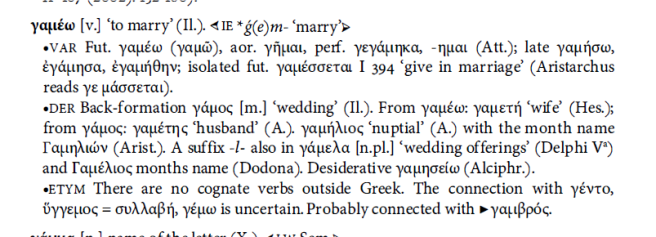Or, how philology is not apolitical….
An Anonymous Grammarian, De Adfinium Vocabulorum Differentia (“On Similar but different words”) 120
“Marrying [gêmai] is different from ‘getting married’ [gêmasthai] in that a man marries but a woman gets married. Homer has made the difference between them clear when he said of getting married: “once she [Epikastê] got married to her own son; and he married her / after killing his father.”
And Anakreon [demonstrates the distinction] when he mocks someone for being effeminate: “and the bedroom in which that guy didn’t marry but got married instead.”
Aeschylus too in his Amumône writes: “it is your fate to be married but it is mine to marry.”
γῆμαι τοῦ γήμασθαι διαφέρει, ὅτι γαμεῖ μὲν ὁ ἀνήρ, γαμεῖται δὲ ἡ γυνή. καὶ ῞Ομηρος τὴν διαφορὰν τετήρηκεν αὐτῶν, ἐπὶ τοῦ γήμασθαι εἰπών (λ 273 sq.)
‘γημαμένη ᾧ υἱῷ· ὁ δ’ ὃν πατέρ’ ἐξεναρίξας
γῆμε’,
καὶ ᾿Ανακρέων (P.M.G. 424 Page = fr. 87 D.2) διασύρων τινὰ ἐπὶ θηλύτητι
‘καὶ †θαλάμοις† ἐν ᾧ κεῖνος οὐκ ἔγημεν ἀλλ’ ἐγήματο’,
καὶ Αἰσχύλος (fr. 131 Mette = fr. 13 N.2) ἐν ᾿Αμυμώνῃ
‘σοὶ μὲν γὰρ γαμεῖσθαι μόρσιμον, γαμεῖν δ᾿ ἐμοί
The distinction between gêmai [or gamein] and gêmasthai [gameisthai] is an important example of Greek active versus mediopassive voice. The active here means “to take a spouse”; while the mediopassive form [according to LSJ] means to “offer to have your child made a spouse” or, “to give oneself in marriage”. This is also a good example of how gendered difference in agency and personhood is structured into basic linguistic distinctions.
As I teach my students, the middle voice is often about indirect agency* (when the agent of an action is not the same as the grammatical subject of the sentence). So, with the verb luô, it means in the active “I release” and in the passive “I am released” but in the middle “ransom”, because in the background is the idea that “x arranges for y to release z”. (And this is a pretty ancient meaning: Chryses appears to the Achaeans in book 1 of the Iliad “for the purpose of ransoming his daughter” [λυσόμενός τε θύγατρα]).
In two examples cited by the anonymous grammarian above words are morphologically middle (γημαμένη and ἐγήματο are aorists, one of the two tenses that has distinct middle and passive morphology in Greek), but the semantics of the words seem less middle than passive to me. At the very least, we have Epikaste “[allowing herself] to be married” in the Homeric example. Anacreon’s joke emasculates the target by taking agency away from him and Aeschylus attests to a similar distinction in the fragment. But the point to take away is that it would be striking in ancient Greece to say that a woman marries someone else as an active agent.
*Often, but not always! The middle voice can be causative, alternate with the active for transitive/intransitive meanings, be quasi-reflexive, or just downright weird (‘idiomatic’!).
Here’s part of the LSJ Entry:

Here’s Beekes on the root:


There is a missed opportunity here for the title “Uncut Gemai” with a Photoshopped poster from that Adam Sandler movie.